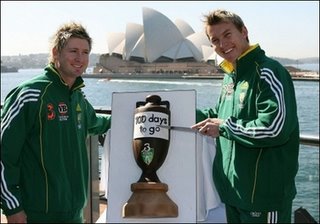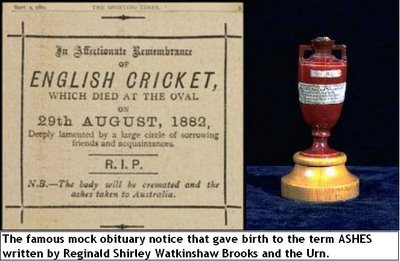 Its exactly 100 days from today England and Australia would be starting their quest for the Ashes. England tries to keep the urn which they deservedly won last year and Australia which had kept it for 16 years, will attempt to regain it back. Number 16 seems to be an unlucky one for Australia as they lost that famous Laxman’s Test to India after winning 16 tests in a row. Anyway that is beside the point.
Its exactly 100 days from today England and Australia would be starting their quest for the Ashes. England tries to keep the urn which they deservedly won last year and Australia which had kept it for 16 years, will attempt to regain it back. Number 16 seems to be an unlucky one for Australia as they lost that famous Laxman’s Test to India after winning 16 tests in a row. Anyway that is beside the point.Earlier in the morning at Sydney Harbor Michael Clarke & Brett Lee cut a cake shaped in the form of the Ashes Urn to mark the countdown.
Starting today I would like to present some interesting facts about the Ashes during the next hundred days (not every day) leading upto the first day of the first test to keep myself occupied,excited and prepared for the big event that’s going to start at Brisbane on Nov 23rd 2006. Here we go:
Ashes Countdown Factoid 100:
It’s a well known fact that The Sporting Times has published the following mock obituary on September 2nd 1882 which led to the creation of the term Ashes for the series between Australia and England ever since.
"In Affectionate Remembrance of ENGLISH CRICKET, which died at the Oval on 29th AUGUST, 1882, Deeply lamented by a large circle of sorrowing friends and acquaintances R.I.P.
N.B. — The body will be cremated and the ashes taken to Australia."

Here are some of the lesser know facts.
Not many people know who wrote that : His name is Reginald Brooks.
Similarily not many people know there was similar mock obituary which was published couple of days earlier in the 31st August edition of a Cricket magazine “Cricket: A Weekly Record of The Game” Which read “English Supremacy in the Cricket Field which expired on the 29th day of August at the Oval”. I doubt if this too, in addition to the 7 run loss that England suffered while chasing a paltry 85 run target, has had any influence on the young London Journalist “Reginald Shirley Watkinshaw Brooks” to come up with the now immortalised Ashes obituary notice.
The poem that appears on the urn which is believed to contain the the ashes of the burnt bails or stumps or may be none of them reads as follows:
When Ivo goes back with the urn, the urn;
Studds, Steel, Read and Tylecote return, return;
The welkin will ring loud,
The great crowd will feel proud,
Seeing Barlow and Bates with the urn, the urn;
And the rest coming home with the urn.
We can only assume that the poem, which was presented to Bligh along with the urn, may very well have been written by Florence, wife of Hon. Ivo Bligh's who lead the 1882-83 English team that toured Australia.
No comments:
Post a Comment